- Beard trimming video
- Lookbook beard trimming
- Why this guide?
- Specialist tools
- Trimming your own beard
- Getting your beard trimmed
- FAQ
- Summary
Beard trimming video
Watch the video guides below for trimming a full beard and a short beard.
Lookbook beard trimming



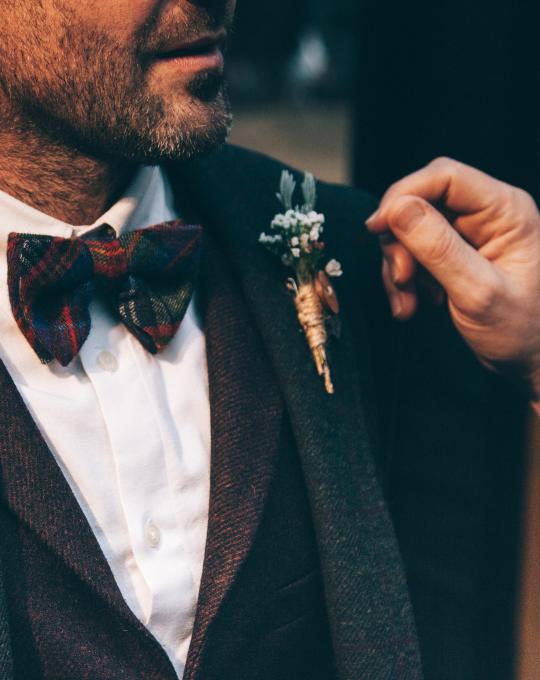








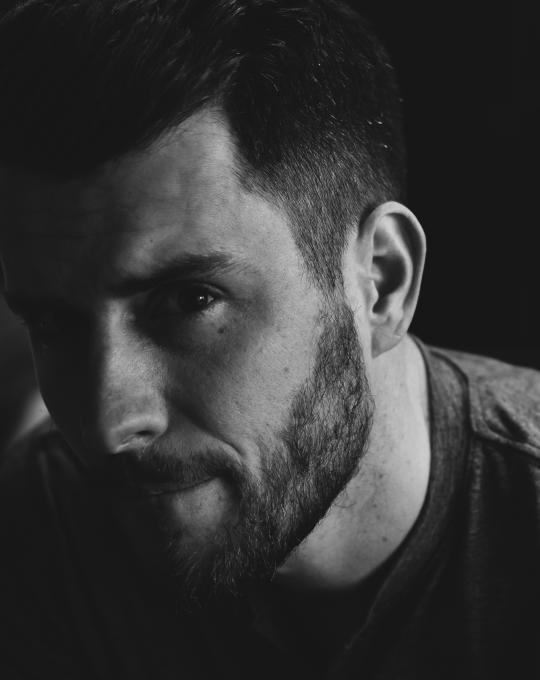
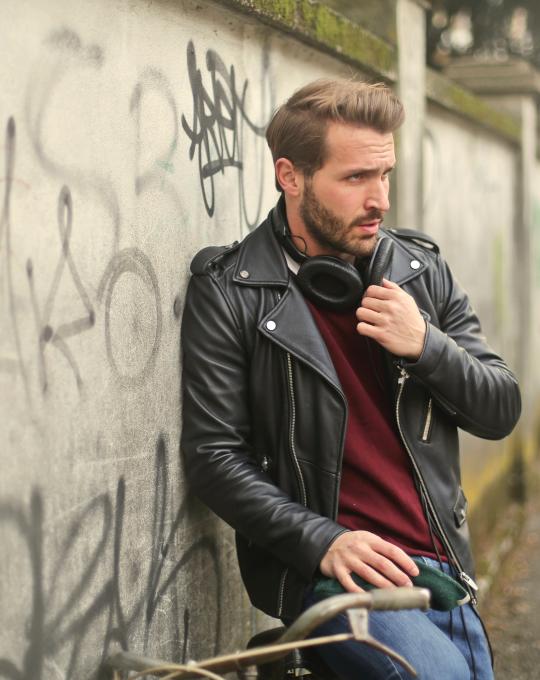







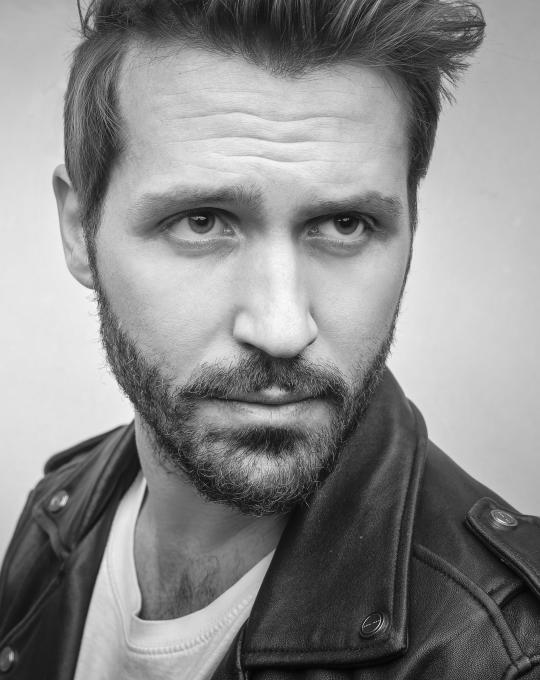
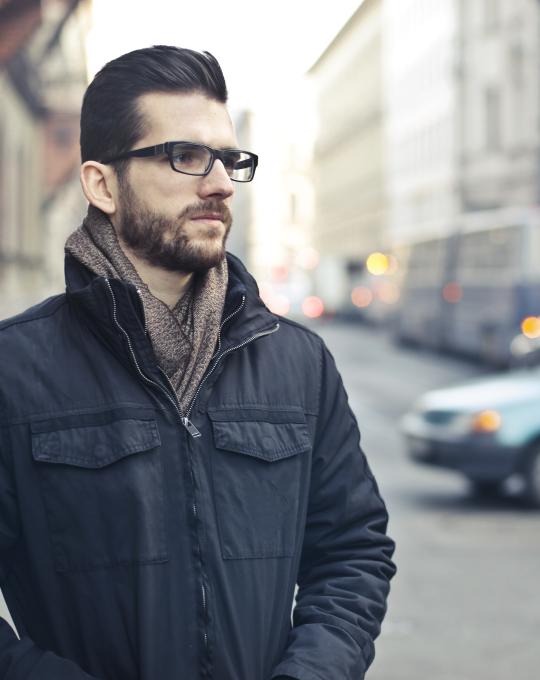



























Why do I need this guide?
Trimming a beard requires more attention and expertise than you’d think. Beards have the tendency to grow however they want, and if not treated right, it can be chaotic. Only you are responsible for the outcome of your beard.
Growing a beard tests your character and perseverance while trimming a beard requires basic knowledge of its rules and know-how. Without this information, it will be difficult to keep your fierce mane in check throughout the growth process.
What you want to avoid is making a mistake that may jeopardize your chances of creating your ideal beard style.
Trimming and cutting a beard actually facilitates the growth process, contrary to what you might think.
Healthy hair follicles ensure that your hair grows faster. However, your hair will also grow in uneven lengths, which can make for a wild look.
If you are reading this guide, you have at least made the decision to look well-groomed, unlike men who opt for a messy beard style.
Regardless of the style you are looking to achieve, this guide will keep your beard looking neat and healthy. These tips can therefore be used for any beard style.
Whether you’re going for a full, classic, skipper, or stubble beard, you simply cannot escape trimming your beard. It is simply a nice side effect of the growth process.
Specialty tools
Not many people understand the importance of using the right tools. Whatever your end goal is, the right equipment will help make the process less frustrating.
There can be a lengthy process and loads of research needs to be done in order to find the right tools. But don’t worry, we’ll be describing some of the special tools you might need to trim your beard.
We will describe how to use them later on in this guide.
- Beard brush. You should use a beard brush before you start trimming your beard. Comb in the opposite direction to your beard hairs so that uneven lengths in your hair are easier to see. You may also use your brush to get tangles out of your beard.
- Beard scissors. Scissors are used to trim details around the mouth and to trim the beard itself. High-quality beard scissors normally have a finger rest that helps you work precisely while trimming.
- Beard comb. A beard comb is a comb with a relatively large space between the teeth, specially made for combing the beard hair (as opposed to a comb for the hair on your head). You can also use a beard comb to distribute balm and beard oil throughout your beard. Finally, a beard comb stimulates the hair follicles for optimal beard growth.
- Beard trimmer. This tool makes it easier to keep your beard the same length all over. Indispensable if you have a uniform beard style in mind.
- Razor. Necessary to define the neckline and shave the fine hairs below the neckline. A clear neckline shows that you take care of your beard and that you keep it with intention.
- Products such as beard oil and beard balm. These care products provide softness, shine, and health to the hair. The extra softness you get from beard oil also makes it easier to trim your hair.
Trimming your own beard
Below you can read a step-by-step to the best way to trim your beard at home to give it a well-groomed appearance.
You can trim the beard in two ways: with just beard scissors or just a beard trimmer. We recommend both because both instruments complement each other.
Use the beard trimmer for large areas and the beard scissors for details. You can also reverse their uses, depending on your personal preference.
Before we begin, we want to emphasize the following:
- Trim carefully.
- Trim with patience.
- Know exactly what beard length you want.
Make trimming a moment for yourself and be flexible.
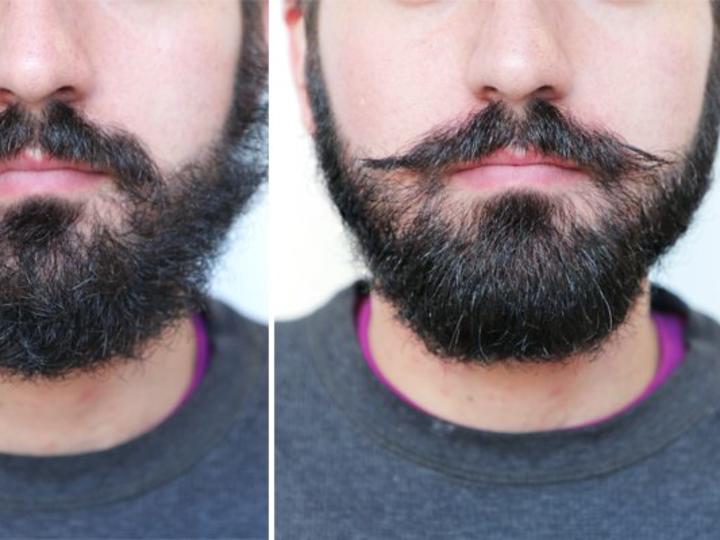
1. Trim with damp skin but make sure the beard hairs are dry.
One of the best times to trim your beard is after a shower. Your pores will be open because of the warm vapor, making it easier to shave the neckline.
But before you start on the neckline, you should trim the beard. For this, make sure that the beard hairs are dry. That way you can better estimate the end result.
In addition, wet hair is more likely to get damaged if you dry it too wildly. An alternative is to use a wet, warm towel.
You may be familiar with this barber’s method: cover your face and neck with a warm towel to open the pores.
Use beard shampoo
This isn’t strictly necessary, but using beard shampoo before trimming usually ends in a better result.
Clean beards are easier to style, comb, and brush (you will notice this immediately if you have used beard shampoo).
→ Read: the best-rated beard shampoo of the moment
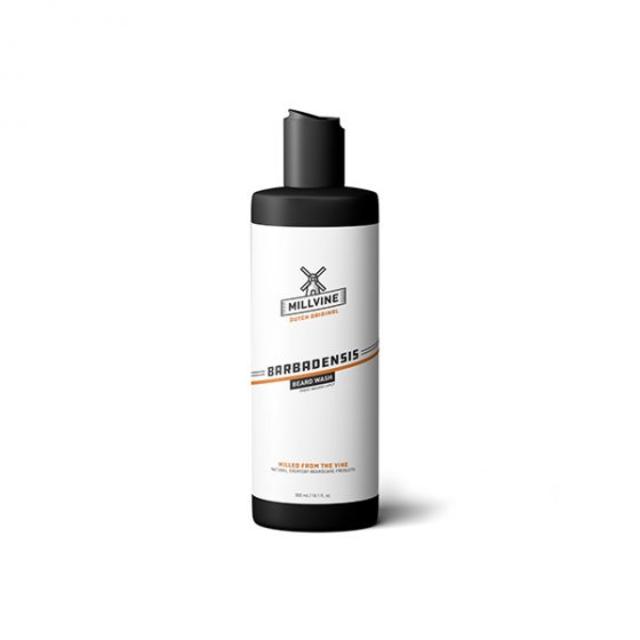
2. Comb beard hair with a comb or brush
Then comb the beard hairs so that the hair is untangled completely.
If the hair is tangled and you start working with the clippers, you risk having some areas shaved shorter or longer, resulting in visible patches.
You can go through your beard hairs with a comb or brush so that all hairs are in the same direction when you start your trim.
Note: a plastic beard comb makes your hair static while combing, so you still have to trim it with uneven lengths.
This is disastrous for long beards, so opt for a wooden or stainless steel beard comb instead.
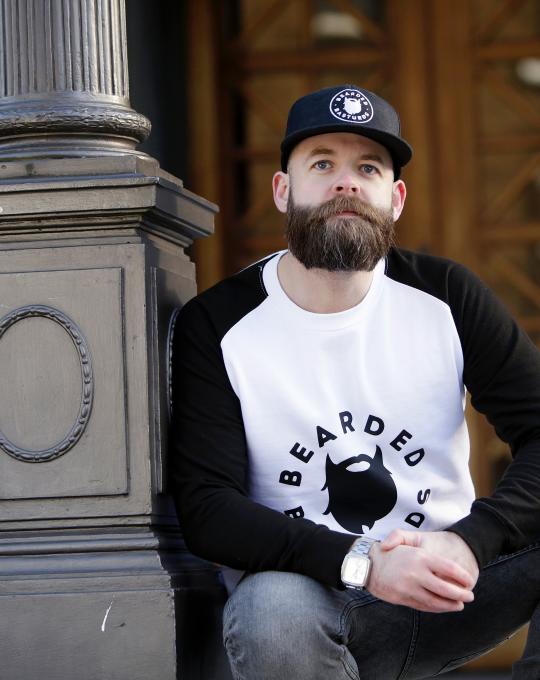
3. Use the beard trimmer on a safe setting
Before you try to shave your beard to its final length with no going back, set the beard trimmer to a longer setting.
That way you’ll get a better feeling when shaving and see how much is actually coming off your beard.
Note: the lengths of the trimmers vary by manufacturer. Position 2 can therefore be slightly longer or shorter on your new clippers.
Most men want to maintain an even length during the growth process. This looks tighter and prevents hair growth.
Since hairs do not all grow at the same speed, you should trim your beard every two weeks. That way you can keep a close eye on the length and see any hair that’s too long clearly.
Double-check: comb the beard hairs again just before you start with the beard trimmer, just to be on the safe side.
In general, use a shorter setting on the beard trimmer on the sides (cheeks, jaw) and slightly longer towards the tip of the beard. This, of course, depends on the purpose of the trimming.
If you are unsure or inexperienced with different lengths, use the same longer length everywhere.
Note #2: dull blades on the beard trimmer will cut the stiff beard hairs in an equally ‘blunt’ way, so that hairs won’t be cut or will be cut poorly.
Make sure to replace the razor every 4-5 months (depending on use) to avoid this.
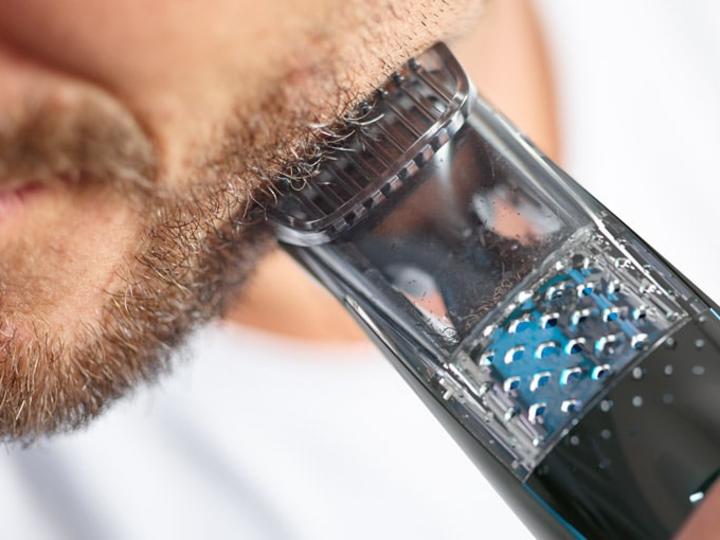
4. Comb and cut the mustache
The area around the mouth is more difficult because it’s not easy to reach.
Double check the mustache, comb it straight and trim it. Beard scissors with a finger rest help for more precise work.
→ Read more: Our selection of premium beard scissors
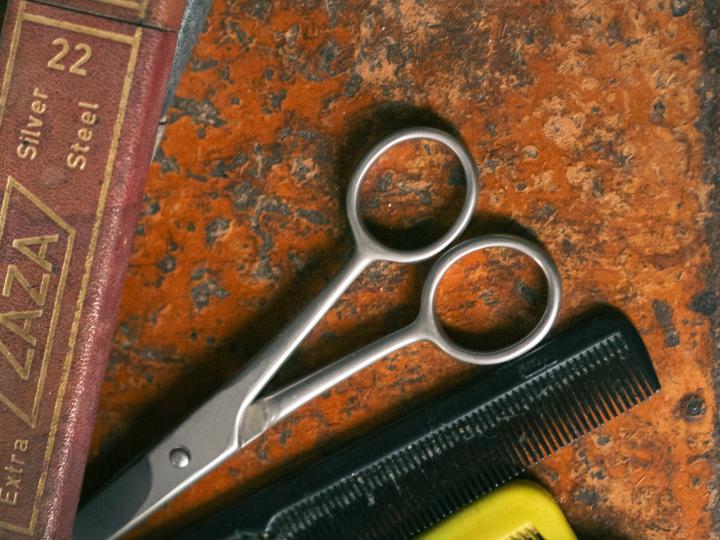
5. Check for wild hair
Trimmers work well - up to a point. There are always hairs that are easily missed by the trimmer.
Check your beard for hair that has not been shaved and trim it using beard scissors.
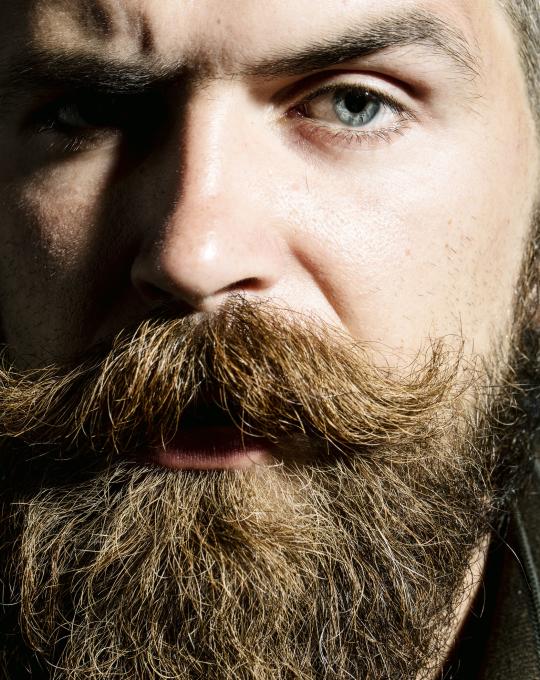
6. Use a soothing beard oil or aftershave (optional)
After trimming, the skin is more sensitive and may even feel tight, just like after a close shave, but to a lesser extent.
In case of tight skin, use a nourishing aftershave or beard oil.
Beard oil ensures that the skin underneath is properly moisturized, which also ensures optimal beard growth.
You can therefore use beard oil after trimming and of course as often as you want during the week.
We recommend using beard oil every other day and alternating with beard balm if necessary.
Aftershave also works fine. Make sure you use an after-shave with nourishing ingredients such as Aloe Vera.
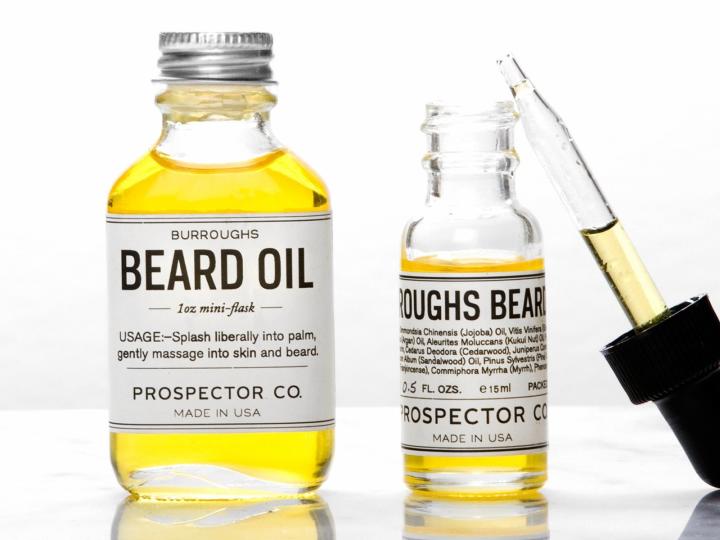
→ Read more: The best beard oils right now
7. Use a cold towel to close pores (optional)
Many barbers choose to use a cold towel after trimming to close the pores again.
This prevents any irritation and ingrown hairs.
Beard trimming on your neck
As we mentioned earlier, defining the neckline is a must. You (probably) don’t want a neck-beard. This is the type of beard where the hairs grow freely on both the face and the neck.
To define the neckline, keep your index and middle fingers together and place them above your Adam’s apple. Then draw an imaginary line from ear to ear (sort of a U shape). This is your neckline — you can shave off anything that falls below it.
Double check that your imaginary line isn’t too high: You want your beard to be visible around the jawline and chin.
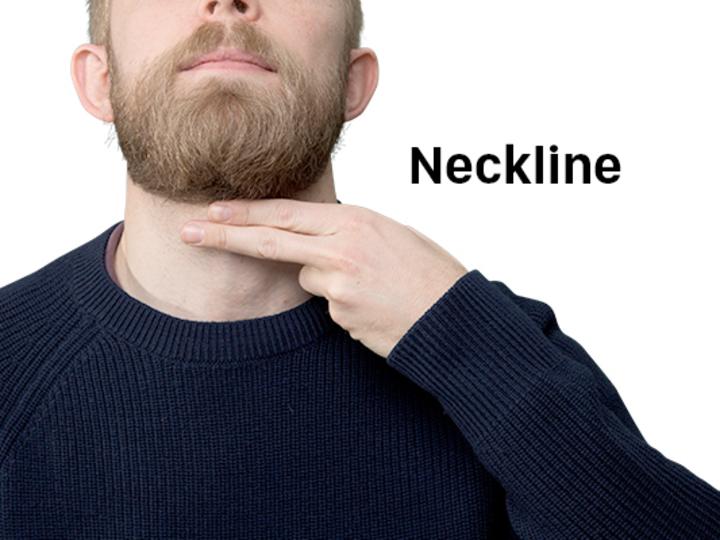
You can choose to “fade” the hairs towards the neckline. You’re actually applying a fade to your beard.
Set the clippers to half the length you used to shave your beard and shave from the neckline towards your jawline.
You are supposed to shave in gradual lengths from the bare skin to the final length of the rest of your beard. That’s how you get the “fade” effect.
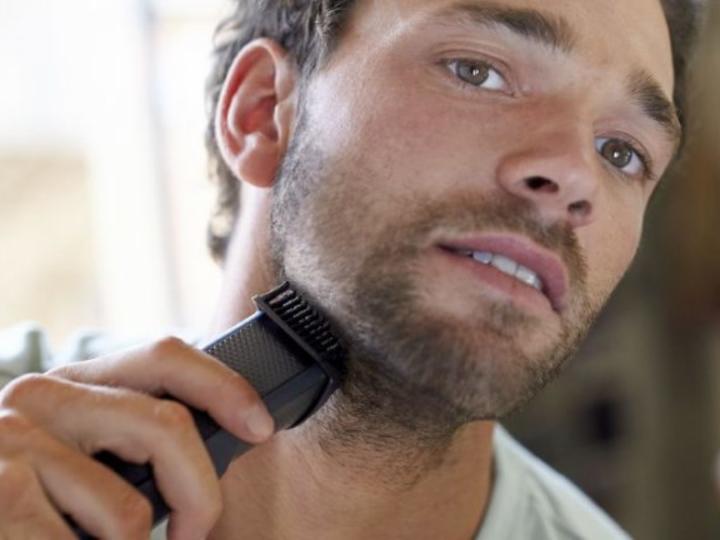
A precision styling razor is an indispensable tool for neckline trimming. These blades are made for an accurate shave and always stay sharp because of the replaceable razor blade. This ensures that you can effortlessly define your neckline.
These days you can define the neckline with the attachments on most beard trimmers.
→ Must read: our top 3 best beard trimmers of the moment
Why you want to define the neckline:
- By creating a good transition between beard and neckline, you can accentuate the jawline
- A clear neckline lends balance to your face and makes it look narrower
Defining the cheek line
The cheek line is the transition between your beard and your cheeks. Just like the neckline, the cheek line won’t be the same for every man.
It’s important to trim the cheek line as well to give yourself a well-groomed appearance. This is how we do it:
Determine the cheek line before you start.
The cheek line is naturally already visible, but as your beard grows and you don’t keep an eye on it all, this imaginary line starts to fade due to overgrowth.
Therefore, you should make sure to determine where you want the cheek line and keep it in mind when updating your beard.
Trim above the cheek line
You can choose from a razor blade, single-edged mustache knife, or tweezers.
Hold the cheek taut with one hand and use your instrument of choice with the other hand to free the area above the cheek line of hair.

Using a shaper
A beard shaper is an ingenious gadget that allows you to effortlessly shave contours with, for example, a razor, especially the cheek line and neckline.
Place the beard shaper in the desired location, hold it firmly and shave away along the edges.
Then use the built-in comb to make the hair even lengths and shave again.
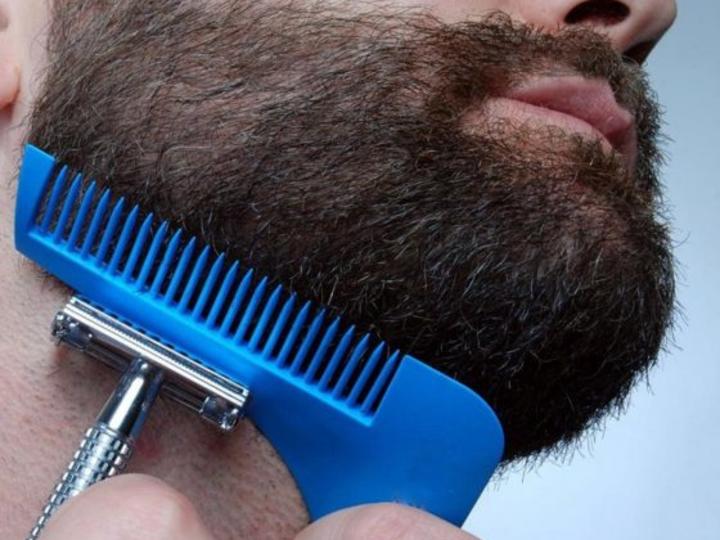
You can buy a quality beard shaper for just €5.
Beard trimming tips
- Don’t wait too long before trimming. We recommend taking the time to trim your beard and incorporating this ritual into your routine. Do it every other week on a relaxed Sunday afternoon, after a nice breakfast or an intense cardio session. If you wait too long you will notice that there are areas where your beard hairs grow much faster, which tends to give you a “scruffy” look. Unless a Sons of Anarchy or ZZ Top beard is your goal, you’ll want to avoid this.
- Invest in decent beard scissors. You’ll use them every time you trim. The best ones are the heavier scissors with a thumb rest precise work.
- Keep the skin taut while shaving.
- Uneven neckline. The neckline stands out because it emphasizes the transition between skin and hair, so take your time to get this line perfect. If you are unsure the first times you try, your local barber will be happy to help you.
- Use beard oil regularly. Think about using beard oil twice a week. Your hair gets enough nourishment that way and is easier to comb. This ultimately makes your beard hair easier to trim.
Getting your beard trimmed
Are you unable to figure the whole beard trimming thing out yourself? Or do you prefer to have it trimmed by a barber the first few times so that the ultimate beard style you have in mind is not compromised?
In that case, having a barber trimmed is the best way to achieve a well-groomed appearance.
Before you enthusiastically make an appointment, it is important to know exactly what you want.
You undoubtedly know by now that communication is the best way to have a good relationship and that is exactly the case in the relationship you have with your barber.
Therefore, here are some things we recommend for you to think about beforehand:
- What beard style you’re looking to go for
- The length and volume (fullness)
- What you’re planning to do about your sideburns
- What length you want to achieve. Always let the barber know about your ultimate beard style goal.
Communicate the length
Always be the first to know whether you simply want to update or maintain your beard or whether a full trim is desired.
Discuss previous times
Let the barber know about the previous times you had your beard trimmed. What went well then? What could be better? Is there a style or detail you like or don’t like this time around?
Be very specific about the length.
Just like with the hairdresser … this is a one-way street, say. Too short in the case of your beard may mean months of growing it back.
Therefore, be extra specific about the length, because what ‘short’ means to one person is ’not-so-short’ to another.
Let us know which products you use.
The barber will undoubtedly advise you on a number of products. Always let us know what you are currently using and how you like it. For example, have you had an allergic reaction to a balm or oil?
Discuss the beard style you want
You are either in the middle of the growth process towards the beard style you have in mind or you are already the proud show off of your favorite beard style.
Whatever the scenario, it is important to tell the barber exactly how or what. You don’t have to know all beard styles by name, but it is good to communicate what the end goal is so that he can think along with it.
→ Read more: The beard styles and models inspiration guide of 2023
Summary
During the growth process, you cannot avoid regularly trimming your beard. By trimming you take care of your beard and skin, which stimulates the hairs to grow extra quickly.
When you finally have reached the desired length, keep trimming so that the hairs are the same length throughout. This gives you a refined and well-groomed look.
The best way to trim the beard is to open the pores with a hot shower or towel. Then you detangle the hair using a beard comb.
Set the clippers to a safe length and then shave the same length everywhere. Trim your mustache and the corners of your mouth with beard scissors. As a final step, use generous beard oil to keep your hair healthy and fresh.
Hopefully, this guide has given you new insights and you will be able to trim your beard effortlessly from now on.
Frequently Asked Questions on Beard Trimming
When can I trim my beard best?
The best time to trim your beard is when you notice a sprawl. This is usually when beard products (e.g beard balm and beard combs) can no longer help. So if you're looking to refine your beard, trimming is definitely the first option you should consider. Check out our top 10 best beard trimmers if you're looking for a handy appliance to help you with this!
How do I trim my beard?
As mentioned, trimming the beard is a minimum of 5 steps, starting with combing the beard hairs so that they are in the right direction. It is then possible to trim the beard to length with an electric beard trimmer or beard scissors. For a more detailed guide, check out our step-by-step beard trimming guide.
Which position should I set my trimmer at when beard trimming?
This depends on the beard style that you have in mind and of course, the length of your beard. Always try trimming on a low setting first so that you don't accidentally shave too much. Check out our comprehensive beard trimming guide for more tips and tricks on how to easily trim your beard.


